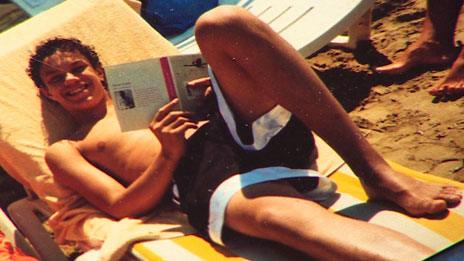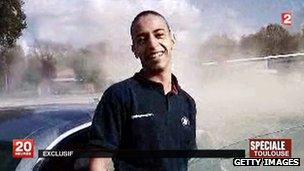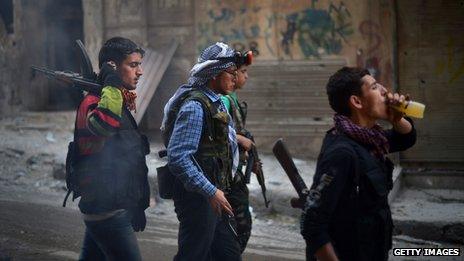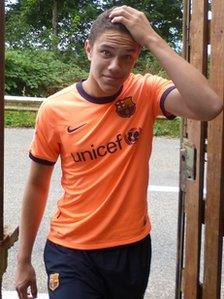From Belgian school to Syrian battleground
- Published

Brian de Mulder became radicalised in Antwerp and is now in Syria
Hundreds of Europeans are fighting with rebel forces in Syria and intelligence agencies are concerned some could return home to launch terrorist attacks. One Belgian family says their son has joined rebels fighting Bashar al-Assad's regime.
A camera shakily films a group of rebel fighters preparing to pray, lined up in rows, their weapons at their feet. A young man walks into shot and takes off his rifle before briefly turning towards the camera.
"That's Brian," says Ingrid de Mulder, pointing at her nephew in the online video on her computer. "I'm 100% sure. That's him. No doubt."
Nineteen-year-old Brian de Mulder from Antwerp is one of hundreds of Europeans authorities believe to be in Syria.
"It's not the Brian brought up by his mother," says Ingrid. "Brian was athletic, he was sporty, he was helping everybody. We never saw him like this. For me it's a programmed robot."
The BBC can't verify the video but analysts believe it was filmed in Syria and European voices can be heard in the background.
Ingrid says Brian converted to Islam two years ago. The family were at first supportive but say he gradually became more radical after getting involved with a group known as Sharia4Belgium.
'Many Europeans' are fighting in Syria, the EU's anti-terror chief claims
"He became fanatic. He wanted to pray only. He left school," says Ingrid.
The family were so worried they moved to a new home 100 miles from Antwerp in the summer last year, but it didn't work.
"He started saying 'I can do whatever I want and even if I die I am not afraid, I will go to the paradise of Allah,'" she says.
Brian left in January this year. By then he had changed his name to Abu Qasem Brazili. His 12-year-old sister Ashia was the last family member to see him.
"Brian told her he was saying goodbye. He said: 'I love you but you will never see me again.'" says Ingrid.
"To leave all your family and not contact your mother anymore. I think he's in a state of being a soldier. A soldier of Allah," she says.
Belgian police raided dozens of houses of people linked to Sharia4Belgium last week.
The authorities have accused the group of recruiting more than 30 people to fight in Syria in the last year.
The EU's anti-terror chief says that hundreds of Europeans have gone there and that some could join radical groups.

Mohammed Merah has apparently inspired French fighters
"Not all of them are radical when they leave. But most likely many of them will be radicalised there, will be trained," says the EU's counter terrorism co-ordinator, Gilles de Kerchove.
He says the UK, Ireland, France, Denmark, Belgium, the Netherlands and other EU nations have significant numbers involved in the fighting.
"As we've seen from previous situations this might create a serious threat when they get back."
"They will be veterans and they may inspire other people and all of this may have a sort of radicalising impact," he adds.
Earlier this month, a survey by King's College London found that up to 600 people from Europe have taken part in the conflict since it began two years ago.
There are other online videos which back up the findings. In one, rebel fighters appear to be in a firefight and a Flemish voice says: "Only shoot once when you see them".
"It's dangerous. Make sure you aim," says a Dutch voice in another video.
Bashar al-Assad has repeatedly said the insurgency against him is largely the result of "foreign-backed terrorists".
So far the US and EU have refused to supply the rebels with weapons, partly over concerns that they may end up in the hands of Islamist extremists inspired by al-Qaeda.

The rebels have been fighting al Assad's forces for two years
Jacques Beres, co-founder of medical charity Medecins Sans Frontieres, says that he treated five injured Europeans in Syria last year.
"Two brothers were from France, two others were from the UK and there was a Swedish national who was of Syrian origin. They seemed to be completely lost. They looked as if they were machines. It was terrifying."
Mr Beres says one of the brothers was inspired by Mohammed Merah, a gunman who killed seven people in south-western France last year in the name of al-Qaeda. Merah was killed in an armed siege after police surrounded his block of flats in Toulouse.
"He (the French brother) told me that the real hero is Mohammed Merah, that he was an example to follow," Mr Beres says.
Intelligence agencies across Europe have stepped up investigations in response to the growing number of European fighters in Syria.
The Netherlands raised the terror threat level from "limited" to "substantial" last month, partly over concerns about radicalised citizens returning.

Brian disowned his family on Facebook
The UK has increased efforts to track how fighters are recruited and funded. And in Belgium, some politicians have called for pre-emptive action to stop young Belgian Muslims from travelling.
"People suspected of wanting to go to Syria should have their ID cards confiscated in advance," says Flemish Socialist MP Hans Bonte.
The EU is pushing to bring in a Europe-wide passenger database for air-travel which in future could help track individuals down.
Questions have also been asked about what Muslim leaders are doing to deal with the problem.
The body that represents Muslims in Belgium has rejected claims they haven't spoken out forcefully enough against radical elements.
"Some people may be talking in a way that might radicalise some Muslims but we categorically condemn this," says Semsettin Ugurlu, the president of the Muslim Executive in Belgium.
"As a body we do not accept words of hate and of violence in mosques," he adds.
For Brian de Mulder's family the waiting continues.
They say Brian put up a notice on his Facebook page a few days ago saying they need to become true believers.
"You are not my family anymore," he wrote. "My Muslim brothers are now my family. If I ever contact you again, you must be on your knees asking forgiveness and convert to Islam first."
He added: "I will never come back to Belgium as it's a country full of unbelievers."
The family say Brian also messaged a friend saying he was near the Syrian capital Damascus.
His aunt Ingrid fears her nephew will never be the same again. But sitting in her garden, staring at photos of him in his old football kit, she clings on to hope.
"I'm praying every day. I hope he sees the light one day. To use their words: inshallah [God willing]."